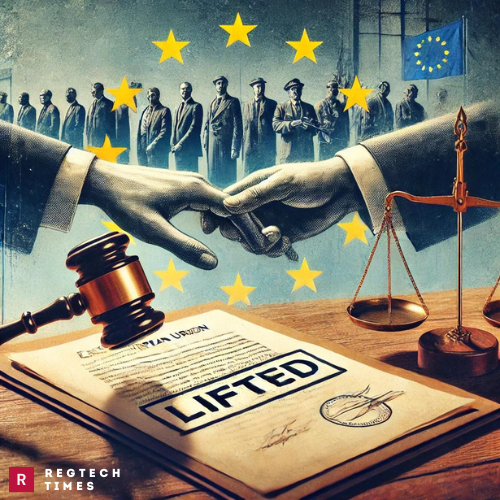The European Union is preparing to remove Nikita Mazepin, a former Formula 1 driver and son of Russian oligarch Dmitry Mazepin, from its sanctions list. This decision comes as part of a broader effort to extend sanctions on individuals and entities linked to Russia’s war against Ukraine, though the removal of Mazepin and others highlights the complex nature of these international punitive measures.
Reports from Radio Free Europe/Radio Liberty (RFE/RL) on September 9, 2023, reveal that EU ambassadors have agreed to lift sanctions on Nikita Mazepin and Violetta Prigozhina, the mother of the late Wagner Group leader, Yevgeny Prigozhin. While the EU is expected to extend sanctions against approximately 2,300 individuals and organizations tied to Russia’s aggression, legal challenges and diplomatic compromises have led to Mazepin’s exclusion from the list.
The Sanctions on Nikita Mazepin
Nikita Mazepin was added to the EU’s sanctions list due to his family connections. His father, Dmitry Mazepin, is a prominent Russian oligarch with close ties to the Kremlin. As a result, Nikita Mazepin was included in the EU’s sanctions following the start of Russia’s full-scale invasion of Ukraine in 2022, as part of a broader effort to isolate influential Russian figures and their associates.
However, Mazepin successfully challenged the EU’s decision in the General Court. He argued that he had no direct involvement in Russia’s political or military actions, and the court ruled in his favor, lifting the sanctions for a specific period. Despite this, Mazepin remained on the EU’s updated sanctions list, which has since been revised based on new criteria.
Now, the EU legal service, which monitors the judicial aspects of the sanctions regime, has deemed Mazepin’s case weak, prompting his removal from the sanctions list.
Violetta Prigozhina’s Removal from the Sanctions List
In addition to Nikita Mazepin, the EU also plans to lift sanctions on Violetta Prigozhina, the mother of Yevgeny Prigozhin. Yevgeny Prigozhin was the infamous founder of the Wagner Group, a private military company closely tied to the Russian state and involved in conflicts across Ukraine, Syria, and several African nations.
Following her son’s involvement in the war and his eventual death in a mysterious plane crash in August 2023, Violetta Prigozhina was kept on the EU’s sanctions list. However, like Mazepin, her case was seen as legally tenuous, prompting the EU to reconsider its position and remove her from the list.
Hungary’s Role in Sanctions Disputes
One of the key reasons behind the removal of individuals like Nikita Mazepin from the sanctions list is the internal pressure from certain EU member states, particularly Hungary. Hungary, under the leadership of Prime Minister Viktor Orbán, has consistently opposed certain sanctions on Russia. The Hungarian government has pushed back on efforts to provide military aid to Ukraine and has advocated for a more lenient approach to Russia, citing its own economic interests, particularly in the energy sector.
China Faces U.S. Sanctions for Ballistic Missiles Support to Pakistan
According to RFE/RL, Hungary played a significant role in the EU’s decision-making process, reportedly demanding that several people, including Nikita Mazepin, be removed from the sanctions list in exchange for Budapest’s support for the broader sanctions extension. Hungary’s opposition to sanctions has often put it at odds with other EU member states, particularly Poland and the Baltic nations, which have advocated for tougher and more permanent sanctions against Russia.
Diplomatic Compromise and EU Sanctions Strategy
The EU’s sanctions policy is a critical part of its strategy to pressure Russia to end its military aggression in Ukraine. However, internal disagreements among member states make maintaining a unified stance difficult. While some countries, such as Poland and the Baltic states, have called for annual sanctions renewals to increase the pressure on Moscow, Hungary and other nations have opposed this.
The removal of Nikita Mazepin and Violetta Prigozhina is the result of a diplomatic compromise that aims to maintain the balance within the EU’s sanctions policy. The bloc will continue to extend its sanctions every six months, while legal challenges and political debates will likely lead to further adjustments to the sanctions list.
The decision to remove Nikita Mazepin from the EU sanctions list highlights the complexity of maintaining a unified sanctions regime against Russia. As the EU continues to navigate legal and political challenges, the case of Mazepin highlights how individual legal victories and internal diplomatic negotiations can shape the broader sanctions landscape. With the EU poised to extend sanctions against hundreds of other Russian figures, the ongoing debate about the future of these measures remains a critical part of Europe’s strategy to confront Russian aggression.
As the war in Ukraine drags on, the EU’s approach to sanctions will likely continue to evolve, with future decisions reflecting not only the situation on the ground but also the diplomatic realities within the bloc itself. For Nikita Mazepin, the removal from the sanctions list marks a significant legal and political victory, but the broader geopolitical consequences of the EU’s sanctions policies remain far from settled.


